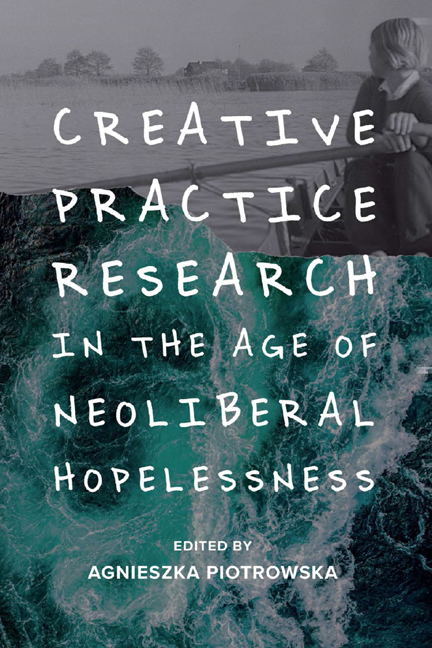Book contents
- Frontmatter
- Contents
- List of Figures
- Notes on Contributors
- Acknowledgements
- Preface: Life in the Post Pandemic Age
- Dedication
- 1 Introduction: Complexities, Compromises and Complicities
- 2 Against the Grain: Women Film Practitioners and Theorists Talk Creative Practice and Theory
- 3 Married to the Eiffel Tower: Notes on Love, Loss and Knowledge
- 4 Creativity and Neoliberalism: Between Autonomy, Resistance and Tactical Compliance
- 5 Tactical Compliance and the Persistence of Elsaesser
- 6 Storytelling and Game Playing
- 7 Autonomy and the Other Woman: Queer Active Agency and Postcolonial Expectations
- 8 From Neolithic to Neoliberal
- 9 First-person Expression on ‘Non-Western’ Screens: China as a Case Study
- 10 Scholarly Exploration of the Creative Process: Integrating Film Theory and Practice
- 11 Teaching Practice as Theory: Guerrilla Filmmaking
- 12 Baits of Falsehood: The Role of Fiction in Documentary or From Untheorised Practice to Unpractised Theory
- 13 Repented: A Creative Intersemiotic Translation
- Notes on Repented
- 14 How do you see me? The Camera as Transitional Object in Diasporic, Domestic Ethnography
- 15 ‘Shut Your Hole, Girlie. Mine's Making Money, Doll’: Creative Practice-Research and the Problem of Professionalism
- 16 Feminist ‘Pensive-creative Praxis’ and Irigaray: A Porous, Dialogical Encounter
- 17 The Paths of Creation, or How Can I Help my Dybbouk to Get Out of Me?
- 18 ‘We Want to Kill Boko Haram’: Reflections on the Photographic Representation of Children in a Displacement Camp
- 19 Between ‘Counter-movement’ (Ingold) and ‘Living with Ghosts’ (Demos)
- 20 Screen Memories: A Video Essay on Smultronstället/Wild Strawberries
- Index
14 - How do you see me? The Camera as Transitional Object in Diasporic, Domestic Ethnography
Published online by Cambridge University Press: 17 October 2020
- Frontmatter
- Contents
- List of Figures
- Notes on Contributors
- Acknowledgements
- Preface: Life in the Post Pandemic Age
- Dedication
- 1 Introduction: Complexities, Compromises and Complicities
- 2 Against the Grain: Women Film Practitioners and Theorists Talk Creative Practice and Theory
- 3 Married to the Eiffel Tower: Notes on Love, Loss and Knowledge
- 4 Creativity and Neoliberalism: Between Autonomy, Resistance and Tactical Compliance
- 5 Tactical Compliance and the Persistence of Elsaesser
- 6 Storytelling and Game Playing
- 7 Autonomy and the Other Woman: Queer Active Agency and Postcolonial Expectations
- 8 From Neolithic to Neoliberal
- 9 First-person Expression on ‘Non-Western’ Screens: China as a Case Study
- 10 Scholarly Exploration of the Creative Process: Integrating Film Theory and Practice
- 11 Teaching Practice as Theory: Guerrilla Filmmaking
- 12 Baits of Falsehood: The Role of Fiction in Documentary or From Untheorised Practice to Unpractised Theory
- 13 Repented: A Creative Intersemiotic Translation
- Notes on Repented
- 14 How do you see me? The Camera as Transitional Object in Diasporic, Domestic Ethnography
- 15 ‘Shut Your Hole, Girlie. Mine's Making Money, Doll’: Creative Practice-Research and the Problem of Professionalism
- 16 Feminist ‘Pensive-creative Praxis’ and Irigaray: A Porous, Dialogical Encounter
- 17 The Paths of Creation, or How Can I Help my Dybbouk to Get Out of Me?
- 18 ‘We Want to Kill Boko Haram’: Reflections on the Photographic Representation of Children in a Displacement Camp
- 19 Between ‘Counter-movement’ (Ingold) and ‘Living with Ghosts’ (Demos)
- 20 Screen Memories: A Video Essay on Smultronstället/Wild Strawberries
- Index
Summary
INTRODUCTION
How do you see me? (2017) is a thirty-minute observational documentary film about my mother focusing on her domestic life and relationship with my father. Filmed over a few months as my parents prepared to sell their house and move home, the documentary explores their everyday lived experience as elderly long-term immigrants, and my relationship with them, refracted through the intermediary of the camera. My family left Iran as refugees in the mid-1980s during the Iran–Iraq war to seek asylum in Britain.
The film was made as part of a practice research project which considered how diasporic experience can be examined through ‘domestic ethnography’ – Michael Renov's term (2004) for documentary films that engage the participation of a filmmaker's own family or kin as central subject. For Renov, domestic ethnography is a unique intersubjective mode of enquiry where ‘self and other are simultaneously, if unequally, at stake’ (2004: 219) as a consequence of the reciprocity and interplay entailed by the close family tie. Documentaries of this kind are not strictly ethnographic participant observations due to the intimate relations existing between the filmmaker and subject. Yet neither can they be simply defined as autobiographies, for some degree of separation still exists between the filmmaker and subject, self and other. Domestic ethnography is therefore distinguished from other documentary practices through its complex amalgamation of ethnography and autobiography where the ethnographer is intimately tied to the subject of inquiry and autobiographical self-knowledge is ‘refracted’ through a ‘familial Other’ (2004: 216). In this sense, domestic ethnography is both distinct from, and closely intermingled with, autoethnography.
One of the central lines of inquiry in the research was to examine the practice of domestic ethnography – and, more specifically, the documentary encounter with a parent – in closer detail. How does the relationship between filmmaker, subject and viewer change in such intimate filmed encounters? What are the implications for the filmmaker, the subject and those in and outside the family circle? What are the commonalities, differences and boundaries between documentary domestic ethnographies and other established, everyday practices of family filmmaking such as the home movie or video?
- Type
- Chapter
- Information
- Creative Practice Research in the Age of Neoliberal Hopelessness , pp. 200 - 220Publisher: Edinburgh University PressPrint publication year: 2020



